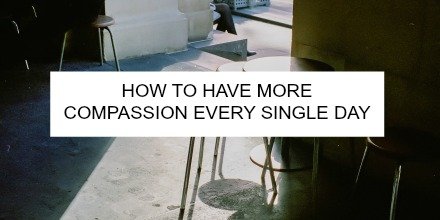
Wouldn’t it be amazing if we could turn on our compassionate like a tap?
When a team member is struggling with the project, instead of thinking “Must I do everything?!” we say “That sounds tough. How can I help?”
When the baby on the plane inevitably throws a fit, we resist the urge to glare and instead put on our headphones and send loving thoughts in the direction of that family.
When our sister calls – for the fourth time – to cry about her break up, we stop and listen.
In a kind, perfect world, we’d react to challenges with compassion every single time.
In the real world, we often react to challenges with eyerolls, indifference, sadness, overwhelm, or frustration.
Compassion is a key ingredient to mindfulness; neither can be practiced on their own.
It’s also a muscle, the more we use it the stronger it becomes and if we don’t use it, it atrophies.
And while compassion belongs to the same family as sympathy and empathy, they’re quite different.
Compassion is not sympathy. Compassion doesn’t feel bad for anyone.
Compassion is not empathy. It does not require you to experience the emotions of another.
Compassion is love in action. When we feel compassion, we actually do something.
Sometimes compassion looks like making the donation or sending the email. It’s writing a card that expresses our support. It’s actively shutting down unkind thoughts.
Sometimes compassion looks like letting an employee go because we can see they’re unhappy and struggling. Sometimes it’s listening respectfully while someone asks you to sign their petition and then saying, “Thanks but no thanks.” Compassion doesn’t require you to be a doormat.
And just as often, we need to direct compassion at ourselves. Self-compassion looks like a three-item, realistic to-do list. It looks like buying pants in a size that fits (not the size we wish fit). It’s ending toxic friendships and taking all our vacation days.
While all that may seem easier said than done, I’ve found a three-word phrase that helps me be more compassionate. When I find myself in need of compassion, I simply say to myself: “Just like me.”
The mom who’s not attempting to quiet her tantruming child? Just like me.
The woman who’s clearly not using her library voice? Just like me.
The guy who won’t let me merge? Just like me.
Because more often than not, I’ll soon find myself in the exact situation I was judging just a few days ago. I’m the woman with the fit-throwing child. I’m the library loud-talker; I didn’t see the car trying to nudge into my lane.
And when that happens – when I’m the one who’s in need of compassion – I hope that the people around me can say to themselves “she’s just like me.”




